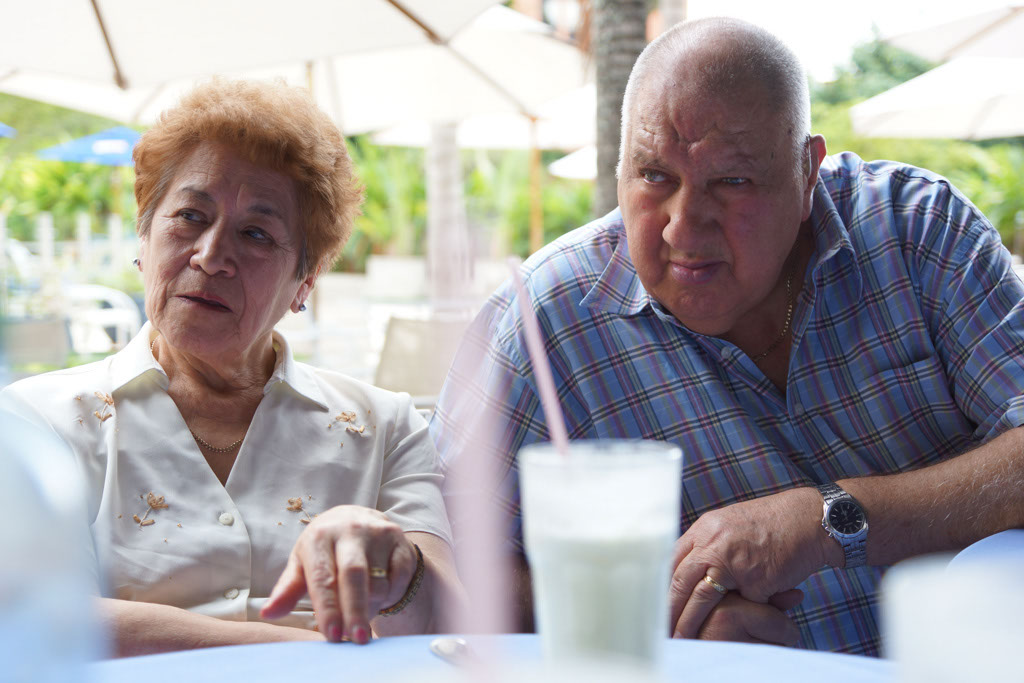
Leopoldo García Lucero
Leopoldo García Lucero was subjected to torture and forced exile under the Pinochet regime in Chile in the 1970s.
LEOPOLDO’S STORY
On 11 September 1973, General Augusto Pinochet overthrew the democratically elected President Salvador Allende in a military coup in Chile.
Leopoldo García Lucero, an Allende supporter, was arrested shortly after the military coup.
He was interrogated about the whereabouts of members of the left-wing political alliance that supported President Allende.
He was held for 635 days in several concentration camps and tortured, including in the National Stadium, one of the largest concentrations camps at the time. His family did not know about his whereabouts until eight months later.
“In the National Stadium they would take us into the open field all night from 8 pm until 7am and we would be looking round at each other and would ask if they were going to kill us.” – Leopoldo García Lucero.
Leopoldo was beaten with a machine gun on his forefront, burned with cigarettes, waterboarded and given electric shocks. Police also threatened that they would kill his daughter.
As a result of the beatings, he lost most of his teeth, his arm was broken, his face was disfigured and his spine was severely damaged. He has been disabled since then.
On 12 June 1975, he was expelled from Chile and forced into exile in the United Kingdom.
Leopoldo, his wife and their three daughters, left behind all their loved ones and possessions.
Leopoldo was recognised as victim of torture number 9.581 by the Valech Commission in November 2004. It is estimated that around 200,000 Chileans were forced into exile and over 38,000 survived torture under the Pinochet dictatorship (1973-1990).
ACTION FOR JUSTICE
REDRESS submitted a petition to the Inter-American Commission on Human Rights (IACHR) in 2002.
It argued that Leopoldo García Lucero’s rights under the American Convention on Human Rights had been violated as he has not been provided with an effective remedy or full and adequate reparation.
The Commission found the case admissible in 2005, and later the case proceeded to be determined by the Inter-American Court of Human Rights.
THE OUTCOMES
The Inter-American Court of Human Rights, the America’s highest human rights court, considered Leopoldo’s case on 20 and 21 March 2013 and Leopoldo was invited to testify during the hearings.
On 28 August 2013, the Inter-American Court issued a landmark ruling, upholding the right to justice and to reparation for Mr García Lucero and potentially impacting on the many other exiled torture survivors from the Pinochet-era.
It was the first time the Court decided the case of a living survivor of torture under General August Pinochet’s dictatorship, and in particular, one subjected to forced exile.
“Overall what satisfies me is this ruling sets a precedent not only in Latin America but for the whole world so that it doesn’t happen again.” – Leopoldo García Lucero.
The Court ordered Chile to pay Leopoldo £20,000 for the lack of justice in his case and ordered it to continue and finalise a criminal investigation “within a reasonable time.”
It also urged Chile to provide adequate funding to Leopoldo to cover the costs of his treatment in the UK for continuing medical and psychological conditions.
On 7 March 2014, Leopoldo received a formal apology and reparations from the Chilean government at its embassy in London.
“Saying sorry does not erase physical or psychological pain; neither does it relieve the suffering of relatives and loved ones. However, it is an act of contrition. It makes us confront our shameful past acts, come to repent them, and ensure that they are never repeated.” – Rodrigo Espinoza, the Chargé D’ Affaires of the Embassy of Chile.
The Inter-American Court judgment on 28 August 2013 also said that Chile “must continue and conclude, within a reasonable time, the investigation into the facts that occurred to Mr. García Lucero”. As part of Chile’s efforts to comply with this requirement, on 9 November 2017, the Chilean Supreme Court made an order asking that the US authorities extradite one of the alleged perpetrators, Carlos Humberto Minoletti Arriagada, to Chile so that he can be tried for crimes against humanity. The Inter-American Court continues to supervise Chile’s broader ongoing investigation, which REDRESS argues remains incomplete. The Chilean investigation has not yet resulted in anyone being convicted or sentenced in relation Leopoldo’s torture.
Leopoldo died on 18 August 2021, although efforts continue to secure the implementation of the outstanding aspects of the Inter-American Court judgment. However, the extradition of Carlos Humberto Minoletti Arriagada could not be achieved before his death in the US on 8 April 2022. Despite this, REDRESS continues to press for the completion of the Chilean investigation.
QUICK FACTS
- Case Name: Leopoldo García Lucero v. Chile
- Court/Body: Inter-American Commission and Court of Human Rights
- Date Filed: 15 May 2002
- Current Status: Decision reached
- Legal representation: REDRESS
KEY WORDS
The American Convention on Human Rights (ACHR), also known as the Pact of San José, is a regional human rights treaty adopted by many countries in the Western Hemisphere in San José, Costa Rica, on 22 November 1969.
